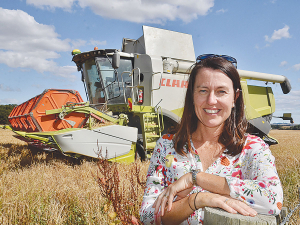An insect pest which since mid-2016 has forced a ban on growing peas in Wairarapa is on the verge of eradication.
No pea weevils have been detected in 25 trap crops planted in the 2018-19 season.
“This is great news for growers, who took a big financial hit to eradicate this insect pest from New Zealand,” says Federated Farmers arable chair Karen Williams.
However, she is keen to dispel the impression given by some media coverage that the ban is lifted.
The Pea Weevil Governance Group, with representatives from MPI, Feds, growers and others will meet late March to decide on future response options. The ban may remain for at least another year.
The weevil, whose larvae eat the inside of growing peas, was discovered in the district in 2016. Growing peas either commercially or by home gardeners was then banned in all Wairarapa south of Pahiatua, to eradicate the pest by denying it its habitat.
Williams, who used to grow 30-40ha of peas near Carterton and originally joined the governance group as a grower representative, said some farmers were sceptical of the ban at the time.
Peas, pea seed, pea straw and pea offal had gone all round the country during that harvesting season. Wairarapa growers feared they would be unfairly penalised if they were hit by a ban, which would then have proved worthless had the weevil popped up elsewhere, she explained.
“As time has gone on, no pea weevil has been found anywhere else around the country, which is pretty exciting news and it reaffirmed that we made the right decision to put a regional growing ban on and take the pain for a few years,” Williams says.
Traps in 25 small pea plots around the region caught 1700 weevils in the 2017-18 season but just 15 in the 2018-19 season in two traps located close to each other in an acknowledged “hot spot” just east of Masterton; no weevils have been found in the current season.
Williams says MPI’s technical advice was that it would like two years of “area freedom” with no weevils detected before it lifts the ban. That raises the possibility of keeping the ban around the hot spot, but lifting it for the rest of the region. That had yet to be debated, she said.
“Can we keep the rules there and lift them somewhere else or does that practically not work with contractors moving in and out of zones that are and zones that aren’t?” Williams asks.
“I hope to have a robust discussion with the governance group about whether a partial lifting of the controlled area notice may be practical or whether a further 12 months full regional ban is necessary.”
However, farmers around the Masterton hot-spot have already told her that if the ban were lifted in the south other growers would get in first and they may miss out on future pea contracts.
Williams says the eradication effort had been stressful.
The group had worked very hard with MPI to get certainty about supporting growers affected by the ban, firstly in compensation, because the Biosecurity Act only allows for compensation for crops destroyed, not for crops not able to be planted.
They had adopted an ex gratia payment approach but there were “a lot of conversations” on the difference in value between alternative crops and what peas would have paid.
MPI had also come up with funding from the Sustainable Land Management and Climate Change (SLMACC) Research Programme to look at alternatives such as oil crops, legumes and bee fodder crops. That had varying success but finding markets for alternative crops is a challenge.
The group also had “limited success” in encouraging seed companies to offer growers alternatives to peas.



















